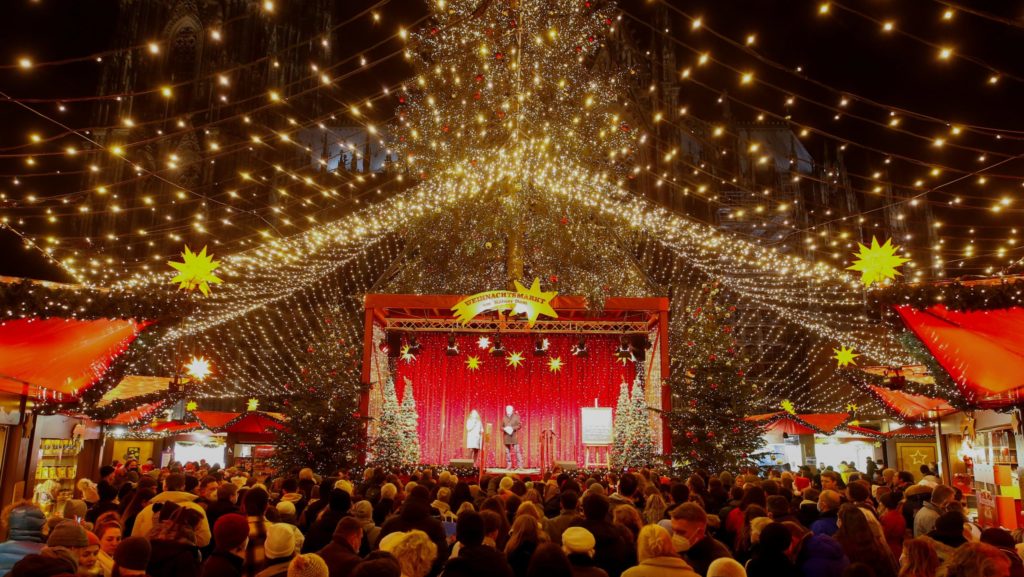It is the season of season’s greetings and celebrations across the spectrum of our society. There will be those offended by “Merry Christmas” and those offended by “Happy Holidays.” Call me a peacemaker, but I have long ago solved that dilemma. In the interest of compromise and inclusivity, I wish everyone a “Happy Christmas.”
Being someone who has to constantly remind myself not to fixate on the superficial nature of being upset by what anyone may call this time of year, there does seem to be a plethora of holiday happenings in and around Southern California, where the “Happy Holidays” sentiment reigns supreme and neither merry nor happy Christmas is rarely part of the equation.
Griffith Park is having its annual LA Zoo Lights, a kind of drive-through secular holiday extravaganza with an animal theme, but not a donkey or sheepdog to be found. Descanso Gardens in La Crescenta has its perennial Enchanted Forest of Light, with trees and bushes lit up in colors that the druids would have used if they had access to the Department of Water and Power. Marina Del Rey will have its Holiday Boat Parade, where boat owners will cruise around the harbor with boats both large and small transformed into floating “floats,” I guess.
It would be enough to make someone grumpy, but only if one forgot the true meaning of Advent.
Our parish school seems to be doing a good job of scheduling Christmas events where Christmas is the theme. First, it is hosting a Christmas faire. Kids will be caroling, there will be food, games, and maybe even a visitor from the North Pole.
Later in Advent, the school presents its Christmas program of songs and stories of that first Noel. Parents and grandparents will all have their phones out, getting the best angle on shepherds, angels, maybe even a camel or donkey.
Our grandson has been practicing his songs for that program every night in the shower. He is still young enough to sing like nobody else is listening, and belts out “Go Tell It on the Mountain” like he is auditioning for “American Idol.”
As I Googled along in my quest for Christmas fare beyond my own parish, I came upon not a midnight clear, but a German Christmas at St. Francis De Sales Church in Sherman Oaks. (No, I am not being paid by St. Francis De Sales for this promotion, but if they want to send me an honorarium, Father Wakefield knows how to find me.)
I must confess I was quite ignorant about what German Christmas meant, other than including one of Germany’s great exports, Johannes Sebastian Bach. Back to Google, I learned how German immigrants helped shape and form how we celebrate Christmas in Southern California and throughout the country.
It is important to know that Christmas in America did not get off to a roaring start. Our early Puritan founders did not celebrate Christmas at all. It was considered nothing more than a bacchanal of “popish” and pagan origin. They backed this sentiment up with the power of the State when, in 1659, “the General Court of the Massachusetts Bay Colony made it a criminal offense to publicly celebrate the holiday.”
But like so many things in America, immigrants brought their traditions with them and over time became American ones as well. There are more Americans with German ancestry than any other group, except for the British. Germans came in great waves to these shores, and Christmas in America came with them.
Everything from taking a perfectly healthy tree, cutting it down, and dragging it into our living rooms, gift-giving, and Advent calendars and Advent wreaths all came from German Christmas traditions. They also brought something called Fire Tong Punch, which consists of mulled wine, high alcohol content, and open flames — which sounds more like it belongs to the third act of a Wagnerian opera rather than on someone’s Christmas dinner table.
Even if you do not want to listen to a 6-year-old belt out “Go Tell It on the Mountain,” or attend any of these events, thanks to some of those great traditions brought to us by German immigrants, keeping Christmas Christmas is just an Advent wreath away.

